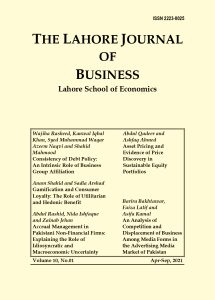Impact of Workplace Incivility on Work-Family Conflict: The Mediating Role of Emotional Exhaustion and Moderating Role of Job Experience
- Sania Moazzam
- saniamoazzam77@gmail.com (Primary Contact)
- PhD Candidate, Suleman Dawood School of Business (SDSB), Lahore University of Management Sciences (LUMS) (Corresponding Author)
Submitted
November 22, 2023
Accepted
November 22, 2023
Accepted
November 22, 2023
Abstract
This study tests the role of emotional exhaustion as amediating mechanism between workplace incivility instigated by three sources (i.e., customers, co-workers and supervisors) and work-family conflict (WFC). We test the role of job experience as a boundary condition affecting the indirect relationship between supervisor incivility and WFC via emotional exhaustion. The sample consists of 235 front-line restaurant worers employed in casual and fine-dining restaurants in Lahore, Pakistan. Structural equation modeling is used to test the hypothesized relationships. Customer incivility, coworker incivility and supervisor incivility are positively associated with WFC. Emotional exhaustion mediates the relationship between workplace incivility instigated by the three sources listed above and WFC. Job experiencestrengthens the positive in direct effect of supervisor incivility on WFC via emotional exhaustion. However, job experience does not affect the positive indirect effect of customer incivility and co-worker incivility on WFC via emotional exhaustion. The WFC literature mostly employs job experience as a control variable. This study is the first to examine jobexperience as a boundary condition affecting the indirect link between supervisor incivility and WFC via emotional exhaustion.
Keywords
Workplace incivility
work-family conflict
emotional exhaustion
job experience,
restaurant servers
Pakistan
This work is licensed under LJB.
- Citation
Moazzam, S., & Malik, M. A. R. (2023). Impact of Workplace Incivility on WorkFamily Conflict: The Mediating Role of Emotional Exhaustion and Moderating Role of Job
Experience. The Lahore Journal of Business, 11(1), 27-55.
- References
2: Adams, G. A., & Webster, J. R. (2013). Emotional regulation as a mediator between interpersonal mistreatment and distress. European Journal of Work and Organizational Psychology, 22(6), 697–710.
3: Agarwal, S., Pandey, R., Kumar, S., Lim, W. M., Agarwal, P. K., & Malik, A. (2023). Workplace incivility: A retrospective review and future research agenda. Safety Science, 158, 105990.
4: Andersson, L. M., & Pearson, C. M. (1999). Tit for tat? The spiraling effect of incivility in the workplace. Academy of Management Review, 24(3), 452–471.
5: Andreassen, C. S., Hetland, J. & Pallesan, S. (2013). Workaholism and work–family spillover in a cross-occupational sample. European Journal of Work and Organizational Psychology, 22(1), 78–87.
6: Annor, F. & Burchell, B. (2018). A cross-national comparative study of work demands/support, work-to-family conflict and job outcomes: Ghana versus the United Kingdom. International Journal of CrossCultural Management, 18(1), 53–72.
7: Babic, A., Stinglhamber, F., Barbier, M., & Hansez, I. (2022). Work environment and work-to-family conflict: Examining the mediating role of heavy work investment. Journal of Management and Organization, 28(2), 398–421.
8: Bakker, A. B., & Costa, P. L. (2014). Chronic job burnout and daily functioning: A theoretical analysis. Burnout Research, 1(3), 112–119.
9: Bakker, A. B., Westman, M., & van Emmerik, I. H. (2009). Advancements in crossover theory. Journal of Managerial Psychology, 24(3), 206–219.
10: Becker, G. S. (1962). Investment in human capital: A theoretical analysis. Journal of Political Economy, 70(5, Part 2), 9–49
11: Bolino, M. C., Flores, M. L., Kelemen, T. K., & Bisel, R. S. (2023). May I please go the extra mile? Citizenship communication strategies and their effect on individual initiative OCB, work–family conflict, and partner satisfaction. Academy of Management Journal, 66(3), 894–925.
12: Bradley, G. (2007). Job tenure as a moderator of stressor–strain relations: A comparison of experienced and new-start teachers. Work and Stress, 21(1), 48–64
13: Brummelhuis, L. L., & Bakker, A. B. (2012). A resource perspective on the work-home interface: The work-home resources model. American Psychologist, 67(7), 545–556
14: Carlson, D. S., Kacmar, K. M., & Williams, L. J. (2000). Construction and initial validation of a multidimensional measure of work–family conflict. Journal of Vocational Behavior, 56(2), 249–276.
15: Chen, H. T., & Wang, C. H. (2019) Incivility, satisfaction and turnover intention of tourist hotel chefs: Moderating effects of emotional intelligence. International Journal of Contemporary Hospitality Management, 31(5), 2034–2053.
16: Cortina, L. M., Hershcovis, M., & Clancy, K. B. (2022). The embodiment of insult: A theory of biobehavioral response to workplace incivility. Journal of Management, 48(3), 738–763.
17: Cortina, L. M., Magley, V. J., Williams, J. H., & Langhout, R. D. (2001). Incivility in the workplace: Incidence and impact. Journal of Occupational Health Psychology, 6(1), 64.
18: Demsky, C. A., Fritz, C., Hammer, L. B., & Black, A. E. (2019). Workplace incivility and employee sleep: The role of rumination and recovery experiences. Journal of Occupational Health Psychology, 24(2), 228.
19: Dicke, T., Parker, P. D., Guo, J., Basarkod, G. … Riley, P. (2022). Ubiquitous emotional exhaustion in school principals: Stable trait, enduring autoregressive trend, or occasion-specific state? Journal of Educational Psychology, 114(2), 426.
20: Earley, P. C., Lee, C., & Hanson, L. A. (1990). Joint moderating effects of job experience and task component complexity: Relations among goal setting, task strategies, and performance. Journal of Organizational Behavior, 11(1), 3–15.
Read More
